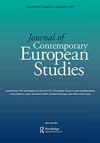Illiberal spectatorship – the disfigurement of citizenship in Hungary and Poland
IF 1.8
3区 社会学
Q1 AREA STUDIES
引用次数: 0
Abstract
Hungary and Poland have been forerunners of democratic backsliding in Europe. Both governments have been building an ‘illiberal democracy’ using the populist promise to return power to the people. We argue that despite this promise, the Fidesz and PiS governments have undertaken political reforms that turn citizens into spectators with a very limited say or take in politics and willing objects of propaganda and disinformation. The turning of citizens into spectators is integral part of democratic backsliding as illiberal policies empty citizenship of its meaning, thus facilitating transition to autocracy. Illiberal regimes 1) capture media to control public opinion, 2) remove the opportunities for citizens to exercise their political agency, 3) redefine the contours of the political community to the extent that critical citizens’ belonging is questioned, 4) and instead of political choices, they present an emotional spectacle, often based on propaganda, fake news or straight lies. Spectators do not merely watch the show, they assist in its creation as fans of leaders who supposedly express and realize their collective will – the voice of true people. This way, spectatorship becomes the societal and cultural underpinning of the illiberal regime, where leaders fake democracy to hoard and hold onto power.狭隘的旁观者——匈牙利和波兰公民身份的毁容
匈牙利和波兰是欧洲民主倒退的先行者。两国政府一直在利用民粹主义承诺将权力归还给人民,建立“非自由民主”。我们认为,尽管有这样的承诺,青民盟和法律与公正党政府已经进行了政治改革,把公民变成了对政治有非常有限的发言权或参与的观众,并愿意成为宣传和虚假信息的对象。把公民变成旁观者是民主倒退的一个组成部分,因为不自由的政策使公民的意义变得空洞,从而促进了向独裁的过渡。不自由的政权1)抓住媒体来控制公众舆论;2)剥夺公民行使政治权力的机会;3)重新定义政治共同体的轮廓,使持批评态度的公民的归属感受到质疑;4)他们呈现的不是政治选择,而是一种情绪化的景象,往往基于宣传、假新闻或直接谎言。观众不仅仅是观看表演,他们还作为领导人的粉丝参与表演的创作,这些领导人应该表达和实现他们的集体意志——真正的人民的声音。这样一来,旁观者就成了这个不自由政权的社会和文化基础,在这个政权中,领导人假装民主,以囤积和掌握权力。
本文章由计算机程序翻译,如有差异,请以英文原文为准。
求助全文
约1分钟内获得全文
求助全文
来源期刊

Journal of Contemporary European Studies
Multiple-
CiteScore
2.70
自引率
7.70%
发文量
84
期刊介绍:
The Journal of Contemporary European Studies (previously Journal of European Area Studies) seeks to provide a forum for interdisciplinary debate about the theory and practice of area studies as well as for empirical studies of European societies, politics and cultures. The central area focus of the journal is European in its broadest geographical definition. However, the examination of European "areas" and themes are enhanced as a matter of editorial policy by non-European perspectives. The Journal intends to attract the interest of both cross-national and single-country specialists in European studies and to counteract the worst features of Eurocentrism with coverage of non-European views on European themes.
 求助内容:
求助内容: 应助结果提醒方式:
应助结果提醒方式:


